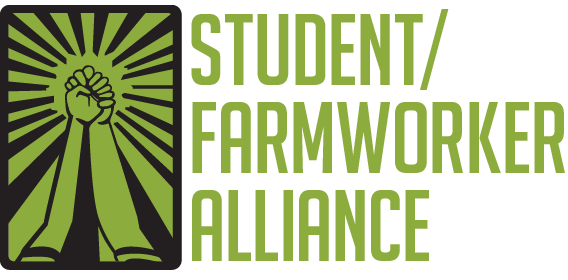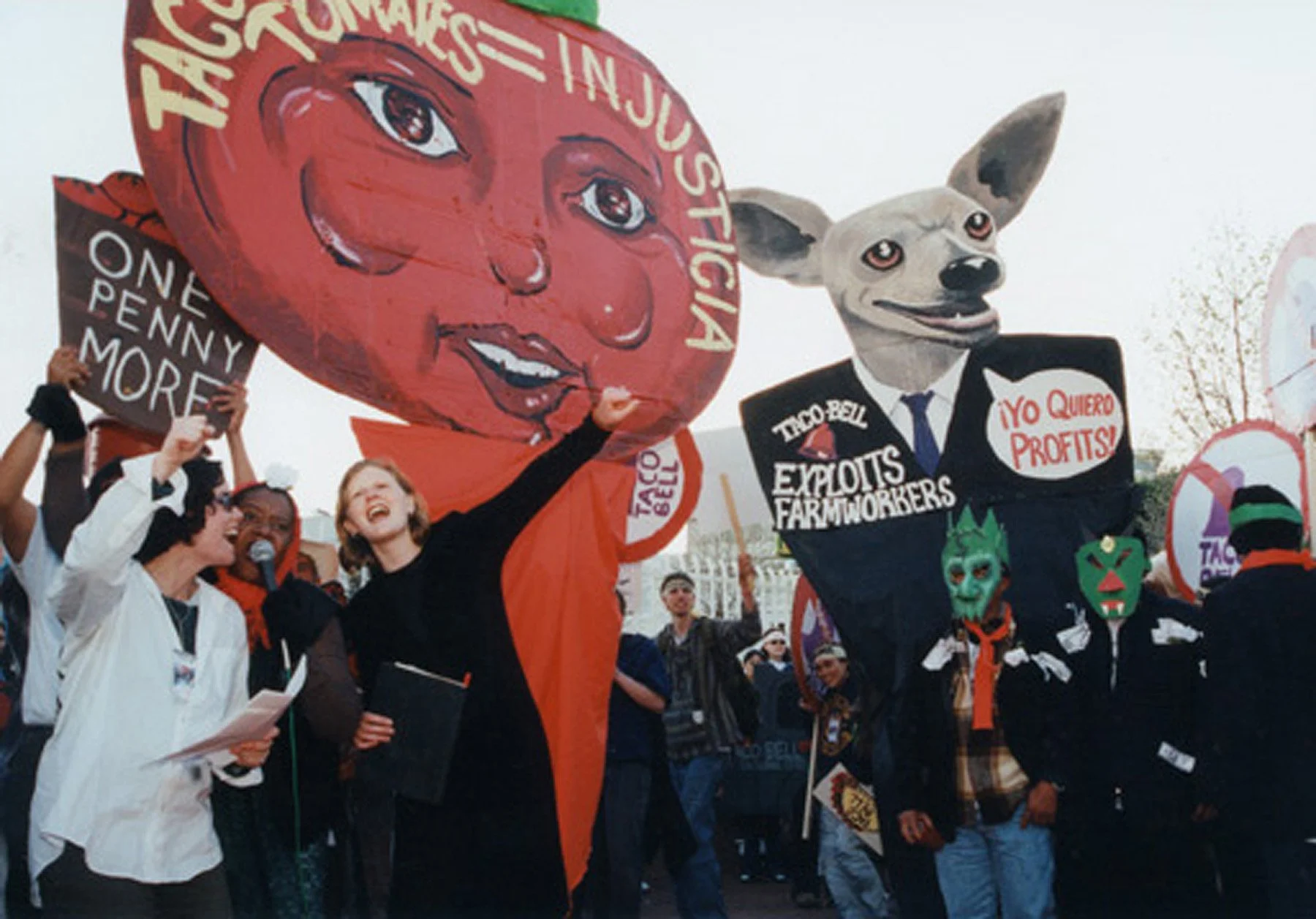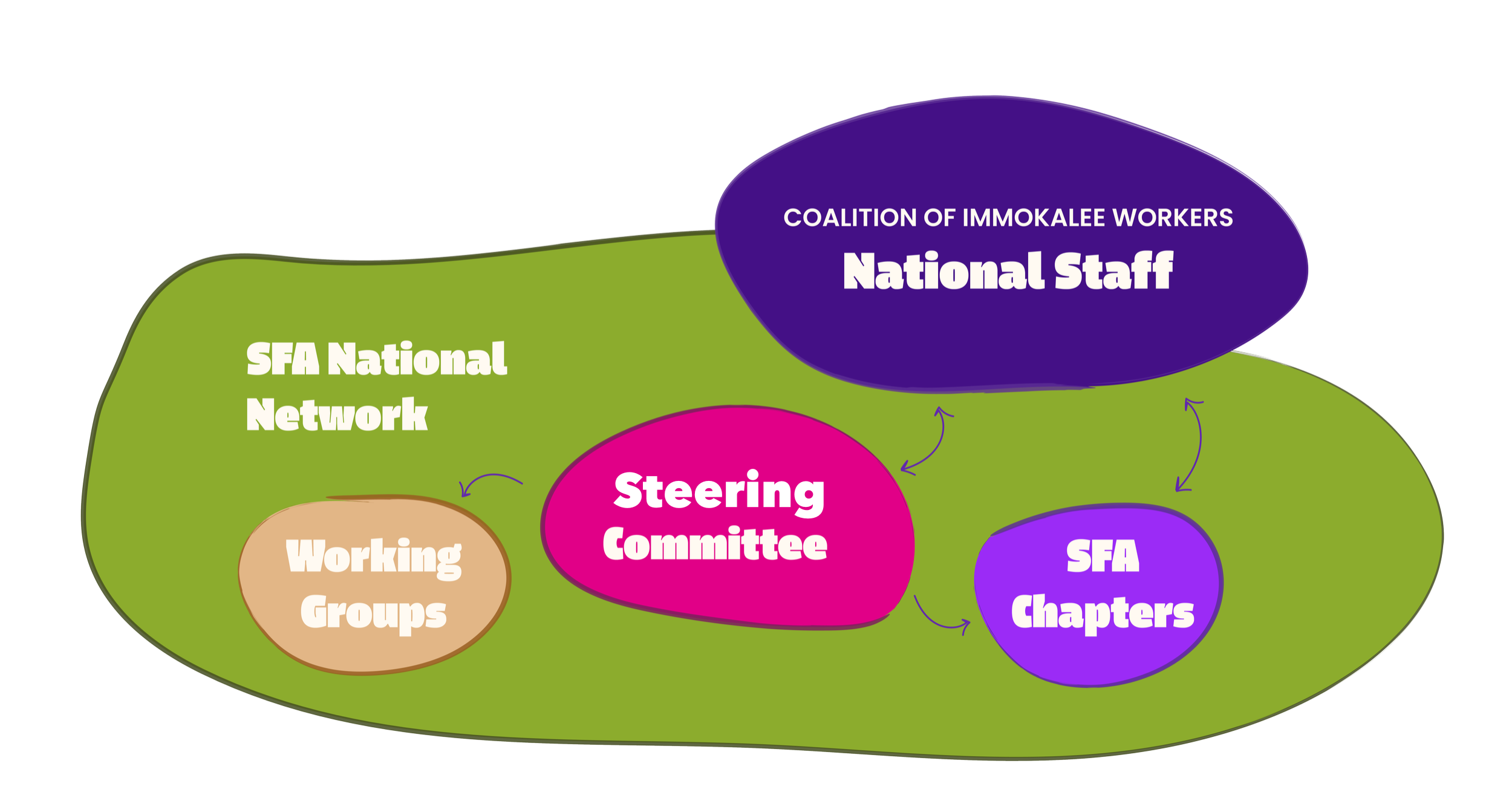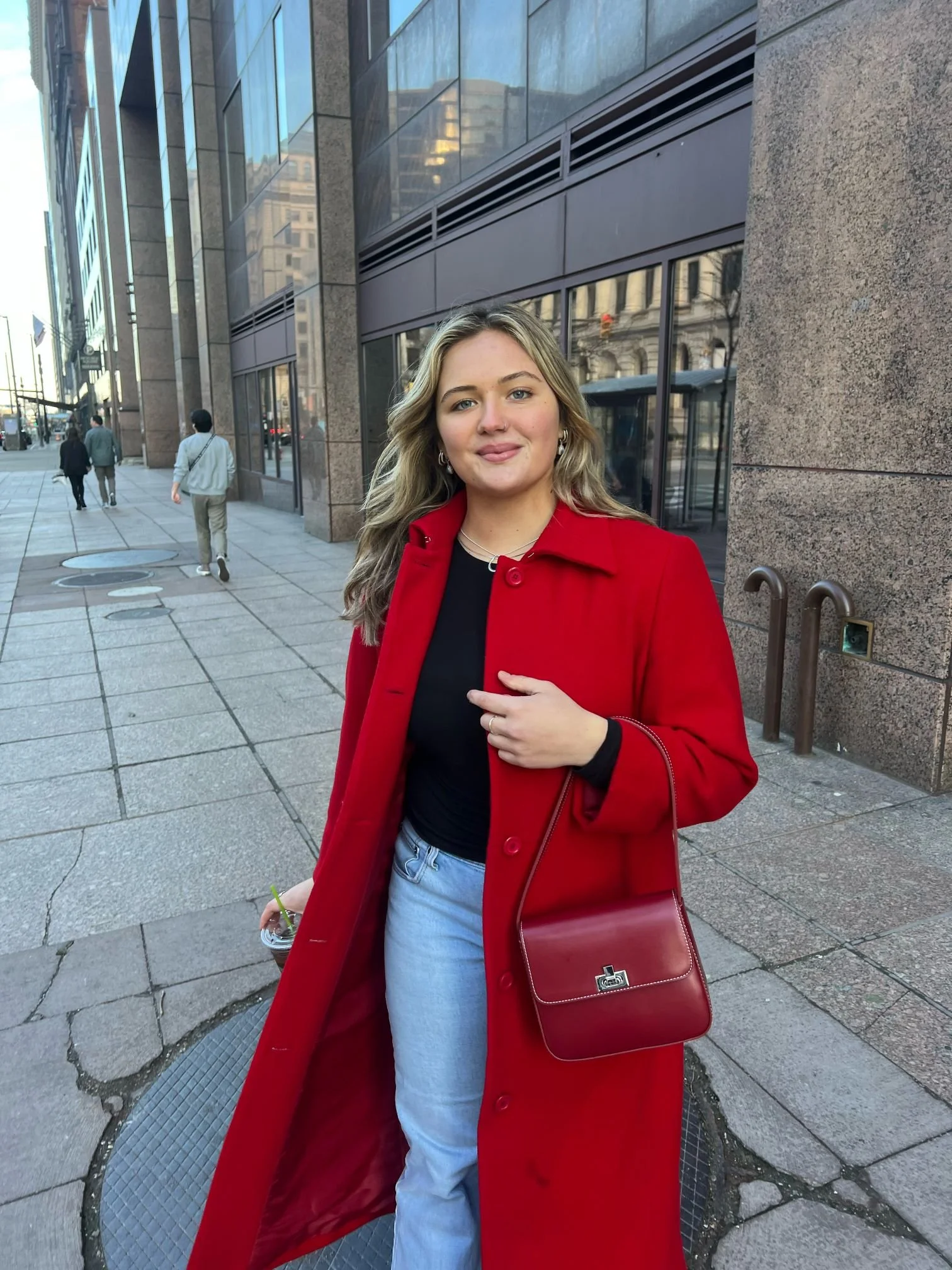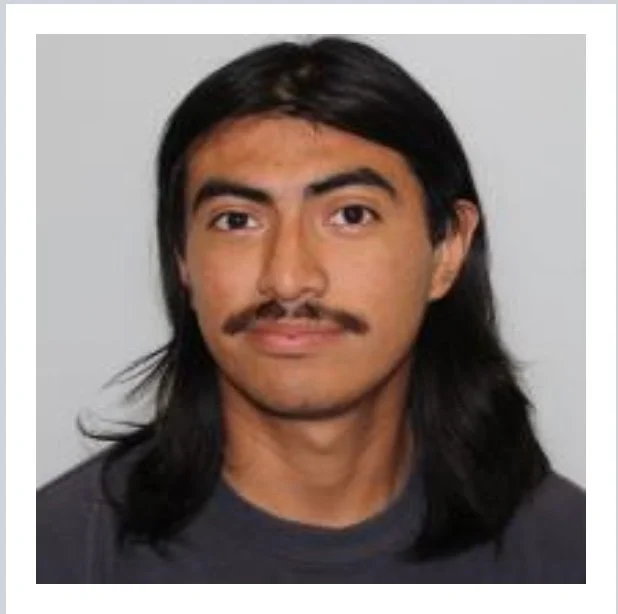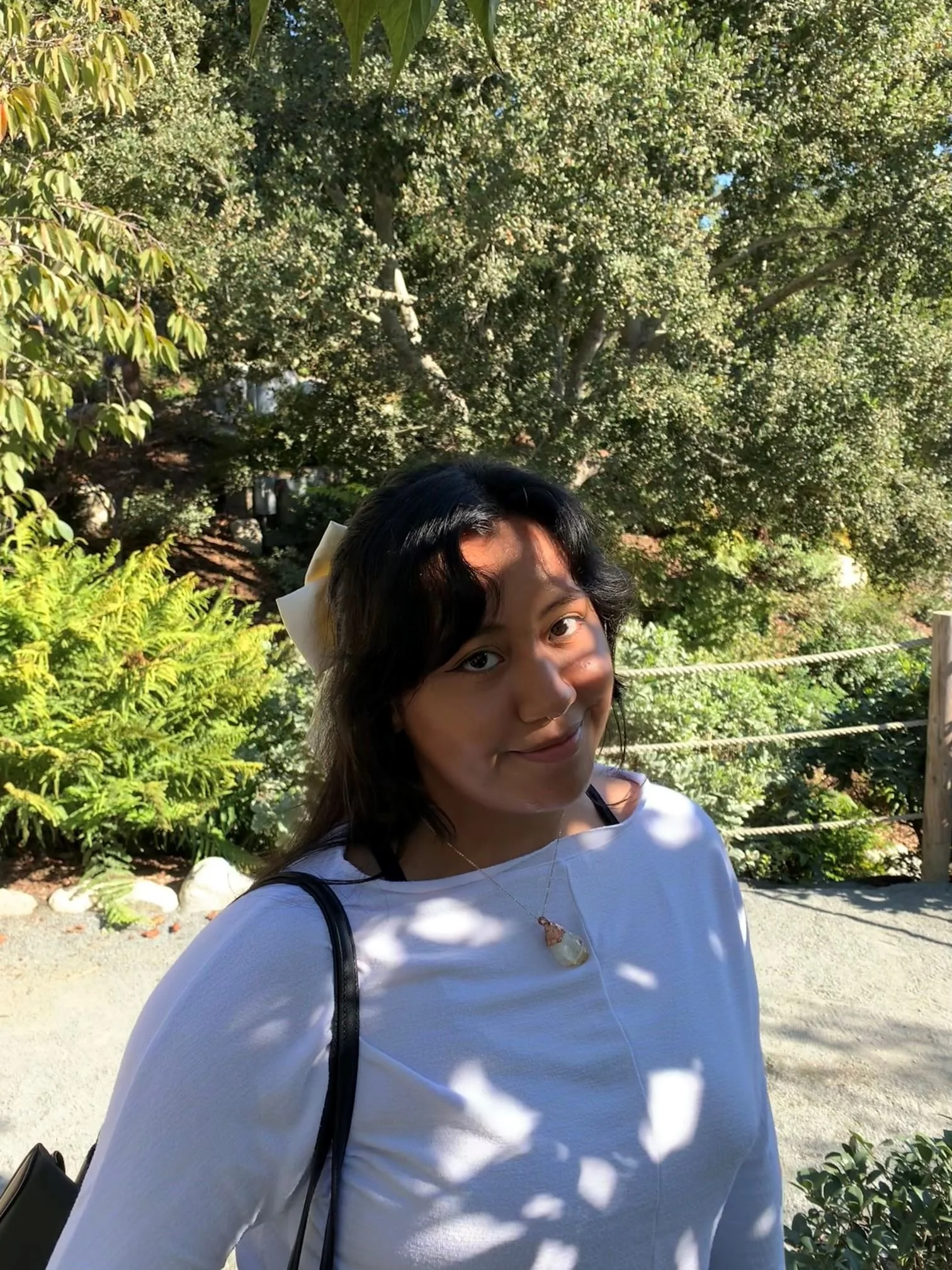
born in action
Our Story
The spark that ignited SFA was the 230-mile March for Dignity, Dialogue and a Fair Wage from Ft. Myers to Orlando, Florida, led by the Coalition of Immokalee Workers in February 2000. This march provided the opportunity for students from several Florida colleges to learn about and directly participate in the movement to end "sweatshops in the fields."
Since then, SFA has been at the forefront of a resurgent farmworker solidarity movement, organizing around the CIW's Campaign for Fair Food starting with the Taco Bell Boycott in 2001.
-
In 2005, farmworkers from the CIW and their allies scored a decisive victory in the national Taco Bell boycott. Yielding to growing nationwide pressure from the CIW, students, and other allies, Taco Bell and its parent company Yum! Brands—the world’s largest restaurant corporation—conceded to all of the boycott’s demands, agreeing to work with the CIW to improve the sub-poverty wages and miserable working conditions of farmworkers in its tomato supply chain. During the Taco Bell Boycott, 25 high schools, colleges and universities removed or prevented Taco Bell restaurants and sponsorships as part of SFA’s Boot the Bell campaign.
Following the Taco Bell victory and seeking to expand the victory's precedents to the entire tomato industry, the CIW led successful campaigns resulting in “Fair Food” agreements with McDonald's, Burger King, Whole Foods and Subway. Once again, students and youth played a vital role in this string of victories that spanned 2007-2008.
SFA returned to intensive campus organizing with the launch of the Dine with Dignity campaign in March of 2009, calling on major food service providers to take responsibility for the conditions in which the produce they serve is harvested. In just 16 months, four of the nation's leading food service companies (Bon Appétit, Compass Group, Aramark and Sodexo) agreed to work with the CIW.
These Fair Food victories and the critical mass of tomato purchasing power they represent contributed greatly to the watershed agreements reached in late 2010 between the CIW and Florida growers to expand the CIW's Fair Food code of conduct to over 90% of the Florida tomato industry.
Since then, SFAers have played key roles in victories against both Trader Joe's and Chipotle Mexican Grill. On January 16, 2014 —in a testament to the immense power built by students, farmworkers, and other allies over the course of two decades — the world's largest retailer, Walmart, also joined the Fair Food Program (FFP), ushering in the expansion of the Program beyond Florida and beyond tomatoes for the first time ever.
Now, as we have in each of the historic "Fair Food" agreements thus far, students will play an indispensable role in breaking the resistance of corporate holdouts like Wendy's and Publix: the only remaining obstacle to a future of fair wages and working conditions in the fields. On campuses across the country, students have pledged to "Boot the Braids", organizing to sever Wendy's licensing contracts until the company joins its fast food competitors as part of the FFP. Throughout the Southeast, young people have picketed, fasted, and marched on Publix stores to send a message that - at least until it commits to the FFP - the supermarket giant will never earn our generation's consumer loyalty.
In sum, SFA has been a driving force behind 14 of the largest victories against corporate greed that our generation has seen, and we're only just getting started.
Our Organizing Philosophy
how we roll
As we work for justice in the fields, we strive to create community by recognizing the transformative power of movement building. We ground our efforts in education, action and the development of student and youth leaders.
SFA is a decentralized network of diverse organizations and individuals whose actions are unified by the following principles:
-
Only farmworkers can speak for themselves. SFA is dedicated to working with farmworkers for change but we will not act on their behalf, instead taking our lead from the workers themselves. Farmworkers' daily experience of working in sweatshop conditions in the fields puts them in the best position to build movements to change those conditions—and the larger power imbalances they stem from. In turn, we take responsibility for organizing our communities to understand—and act on—our role in this movement.
Our struggles are not the same but they converge.
Both farmworkers and young consumers are objectified by the corporate food industry: farmworkers are seen as tractors that harvest raw materials cheaply while youth are seen as mouths that obediently consume branded, unsustainable products. In an increasingly polarized global economy—where the growing concentration of wealth and corporate power threatens nearly everyone—it is imperative that we unite in common struggles and create meaningful solidarity with one another.
-
Young people have a powerful voice in our communities. Historically, we have been creative and forceful catalysts for change, and today young people are at the forefront of movements throughout the world confronting injustice.
Students have a powerful voice on our campuses and can hold our educational institutions accountable for who they chose to do business with. In the words of students at the National Autonomous University of Mexico (UNAM), who waged a 9-month campus-wide strike in 1999: “The University belongs to those who study in it!”
Consumers have a powerful voice with corporations that profit from worker exploitation. With this awareness, we can pierce the veil of branding and multi-billion dollar advertising budgets, disrupting business as usual for unethical corporations.
-
As a network comprised of people with diverse backgrounds and experiences, we strive to keep a focus on collective liberation at the forefront of our work so that we do not reproduce patterns of oppression. We believe that organizing according to these principles is essential to building truly democratic and effective social movements that can win systemic changes while prefiguring the type of world we want.
through the decades
Our Victories
how does our network?
Network Structure
-
Our national network is made up of any students and young people who are actively organizing around the Campaign for Fair Food. It is a decentralized network, defined by the character and creativity of a multitude of communities and drawn together by our collective commitment to follow farmworker leadership. We build our network through education and action, and — in the spirit of CIW's "Consciousness + Commitment = Change" philosophy — we believe that both consciousness and commitment are a necessary part of a vibrant movement for justice.
-
The Steering Committee (SC) is SFA's main organizing body, comprising a dynamic group of about fifteen youth leaders from around the country. SCers educate, organize, and mobilize support around the Campaign for Fair Food in their respective communities, regions and networks. They maintain regular communication with the staff and work to build leadership within the national network.
-
Living and working in Immokalee, the SFA national co-coordinators are responsible for the organization's day-to-day operations, maintaining daily communication with the CIW and regular contact with members of the national network and SFA leadership. Other staff responsibilities include: national campaign strategy coordination; fundraising and organizational development; communications and graphic design; educational co-presentations and workshops; national tour/mobilization logistics and outreach; and on-the-ground support for the farmworker community in Immokalee.
-
Working groups exist within the SFA network to help drive certain aspects of our work forward. Some working groups are temporary and are formed around specific needs such as campaign research or student-specific organizing. Working groups communicate via conference calls and listservs and are a point of access where anyone in the network can become more involved in shaping the direction of SFA. The Steering Committee and staff help coordinate working groups to ensure continuity with SFA's campaigns, needs, and processes. To get involved with a working group, contact us.
student leadership
2025 Steering Committee
national staff
SFA Coordinators
GISELLE RAMIREZ-GARCIASFA National Coordinator
Immokalee, FL
